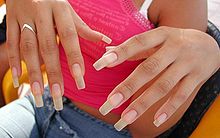Dolichonychia
This article needs additional citations for verification. (December 2021) |
| Dolichonychia | |
|---|---|
 | |
| Moderate dolichonychia of the nail beds combined with long free edges | |
| Complications | None, but it depends on which disorder it is possibly associated with |
| Usual onset | Congenital |
| Duration | Life-long |
| Causes | The cause may vary among people with dolichonychia, in some, it is an isolated trait, in others, it might be a symptom of a connective tissue disorder, such as Marfan syndrome |
Dolichonychia is a medical condition in which the nail beds of the fingers and toes are abnormally long and slender, specifically, a finger nail index of 1.30 or more,[1] it is a common feature in people with connective tissue disorders, such as Ehlers–Danlos syndromes, Marfan syndrome, and hypohidrotic ectodermal dysplasia.,[2] it often appears alongside arachnodactyly and/or dolichostenomelia, which is the condition of having long and slender fingers and toes.
See also[edit]
References[edit]
- ^ Cohen, Philip R.; Milewicz, Dianna McGookey (April 2004). "Dolichonychia in women with Marfan syndrome". Southern Medical Journal. 97 (4): 354–358. doi:10.1097/01.SMJ.0000110333.94390.E1. ISSN 0038-4348. PMID 15108828. S2CID 38219958.
- ^ Cohen, Philip R.; Milewicz, Dianna McGookey (9 April 2004). "Dolichonychia in women with Marfan syndrome". Southern Medical Journal. 97 (4): 354–358. doi:10.1097/01.SMJ.0000110333.94390.E1. PMID 15108828. S2CID 38219958. Retrieved 9 December 2021 – via PubMed.
